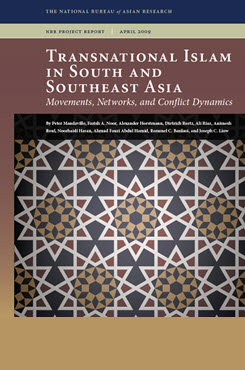From Transnational Islam in South and Southeast Asia: Movements, Networks, and Conflict Dynamics
Local Networks and Transnational
This essay assesses the impact of transnational Muslim networks on the social, political, and conflict dynamics of Thailand.
EXECUTIVE SUMMARY
This paper assesses the impact of transnational Muslim networks on the social, political, and conflict dynamics of Thailand. By observing three key transnational Islamic networks—the Muslim Brotherhood-influenced Young Muslim Association of Thailand (YMAT), the Jemaat Tabligh, and the Salafi-Reformist network—this paper finds a tremendously fluid and dynamic Muslim terrain in southern Thailand, where representations of Islamic creed, legitimacy, and authority are increasingly contested. The paper also provides an in-depth look into the transnational dimensions of the contemporary Muslim-based resistance in the southern provinces. Here, the paper argues that there is little substantive evidence of any sustained penetration of the southern Thailand conflict by transnational militant groups.
MAIN FINDINGS
The past two decades have witnessed a proliferation of new sources of religious authority and norms in Muslim Thailand, particularly in the southern Muslim-majority provinces. These new Islamic groupings and alignments not only serve religious functions, but are also transforming social and cultural institutions as well. The authority of the traditional religious establishment in southern Thailand is gradually eroding as the terrain of Islam in the country is increasingly shaped by a proliferation of modern and transnational forces. These transnational groups and networks are not only engaging with traditional local forces but also among themselves, thereby enlarging the kaleidoscope of Muslim networks and influences in the country. Notwithstanding the weakening of traditional religious monopolies and the pluralization of ideas, imported ideological influences have hardly been adopted wholesale. Instead, one witnesses constant processes of negotiation as these ideas and practices are localized, thereby adding to the dynamism of the socio-religious terrain. By and large, the Thai state has sought to accommodate Muslim networks as they are not seen as a threat to its political legitimacy. As a matter of fact, many of the key Islamic groups active in Thailand, such as the YMAT or the Jemaat Tabligh, are quietist in political orientation. Other Islamic groups, such as the Salafi-Reformists, are lending support to the state and bolstering its credibility in Muslim eyes. As of yet, there is no evidence that these groups or any other major transnational Muslim networks are involved in the current violence and militancy in the southern provinces.
POLICY IMPLICATIONS
- Because of the weakening of traditional religious monopolies and the diffusion of religious authority, any attempt to engage Muslim leaders, groups, and movements in southern Thailand will have to tread carefully so as not to marginalize or alienate pivotal players.
- Given the continued importance of traditional Islam to matters of culture and identity in southern Thailand, the inevitable repercussions from the erosion of authority, precipitated by the “new” forms of belief and practice, have to be managed carefully.
- Considering the very complex dynamics that define transnational-local networks in Thailand, any attempt at neat categorization will, at best, be arbitrary. Policymakers would benefit by dealing with issue-specific cases rather than generalized categories of groups and movements.


